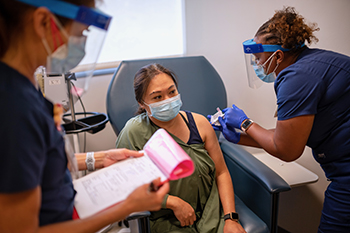The coronavirus vaccine developed by Pfizer Inc. and BioNTech that is being administered worldwide is 95% effective in preventing COVID-19, according to a study published in the New England Journal of Medicine that includes clinical trial data from UC Davis School of Medicine.
 Marites Ramos, a UC Davis Health medical assistant, received her injection for the Pfizer COVID-19 clinical trial in August
Marites Ramos, a UC Davis Health medical assistant, received her injection for the Pfizer COVID-19 clinical trial in August
Of the 21,720 people in various countries who received the vaccine during the study period, only eight contracted COVID-19. Of the 21,728 who were dosed with the placebo, 162 contracted COVID-19.
In addition to being highly effective, the vaccine was deemed safe, according to the study, because side effects were minimal and similar to those associated with other vaccines.
The findings of the phase 2/3 study published in the journal's Dec. 31, 2020 article, "Safety and Efficacy of the BNT162b2 mRNA Covid-19 Vaccine" confirm data that Pfizer previously released when it sought emergency use authorization. The journal article represents the official, peer-reviewed findings that confirm details of what had been reported.
UC Davis was the only academic medical center on the West Coast to participate in the trial.
The article's supporting documents link to a long list of co-authors connected to the clinical trial at 152 research sites around the world, including Timothy Albertson, principal investigator of the UC Davis School of Medicine effort and chair of the UC Davis Health internal medicine department. (The co-principal investigator at the UC Davis School of Medicine is Angela Haczku, associate dean for translational research.)
"This was a huge team effort to contribute almost 230 patients to this critical study," Albertson said.
He added: "Really, every part of the health system participated to get this study started and completed in such a short time during very challenging times. Our employees and faculty who volunteered as subjects are heroes. Our brave community volunteers ensured diversity. Our faculty and clinical research associates were adaptive and dedicated. Our research nurses and staff were amazing. The best part was, as an employee, I was able to get the vaccine we studied once it was made available to frontline health care workers."
The Pfizer-BioNtech vaccine was the first COVID-19 vaccine released in the United States. More than 5,800 UC Davis Health employees, physician residents and students have received at least their first of two Pfizer doses. (More than 11,000 employees have been inoculated, with either the Pfizer or Moderna vaccine). UC Davis Health patients over age 75 will begin to be inoculated this week.
UC Davis enrolled diverse participants
UC Davis School of Medicine enrolled ethnically and racially diverse participants for the trial during a short period of time this summer, making it one of the most fast-paced research efforts at UC Davis Health.
"We are proud of Dr. Albertson and his remarkable Pfizer vaccine clinical trial team, who worked tirelessly to bring this safe and effective vaccine to our community," said Allison Brashear, dean of the UC Davis School of Medicine.
"The tremendous diversity of participants in the School of Medicine's Pfizer study is reflective of our longstanding partnership with our community and regional partners," Brashear said. "We are grateful for our community's support of our life-saving research to protect our patients, families and communities."
The coronavirus pandemic has greatly affected essential workers, many of whom are Latino and Black, which is why UC Davis Health worked with its community partners to enroll a significant proportion of racial and ethnic minorities.
Of the 225 enrollees in the UC Davis School of Medicine clinical trial, 59% are White, 36% are Latino, 15% are Asian, 10% are Black, and 6% are Native American. (Because Latinos may be of any race, total percentages do not total 100%.)
The demographic makeup reported in the overall Pfizer study, according to the article, is: 83% White, 28% Hispanic and 9% Black. Although the clinical trial enrolled people from many races and ethnicities, the article did not include a more specific demographic breakdown.
Minimal side effects
The trial's safety profile noted minimal side effects such as transient, mild-to-moderate pain at the injection site and fatigue. The side effects were reported more often by younger participants (ages 16 to 55), and more often after the second dose, which was administered three weeks after the initial injection.
Some 16% of younger participants reported having had a fever after the second dose, compared to 11% of older participants.
While the study did not set out to assess the efficacy of a single-dose regimen, it nevertheless concluded that vaccine efficacy between the first and second doses is 52%. In the first seven days after the second dose, efficacy was 91%. Full efficacy (95%) was reached at least seven days after the second dose.
The trial, which began in July, was intended to last two years for both the vaccine and placebo participants. However, "given the high vaccine efficacy, ethical and practical barriers prevent following placebo recipients for two years without offering active immunization," the article stated.
Therefore, some participants who got the placebo were offered the vaccine after the U.S. Food and Drug Administration issued Emergency Use Authorization last month, as long as they were eligible under priority guidelines set by public health agencies.
Albertson, a leading expert in pulmonary and critical care medicine who treats patients with COVID-19, is proud of the role the UC Davis School of Medicine and UC Davis Health system have played in contributing research to end the global pandemic. The virus has claimed nearly 2 million lives worldwide, including more than 375,000 in the United States.
"What this says about UC Davis Health is, we are leaders in critical health research," he said. "And even more important: we can come together and participate as a team."






